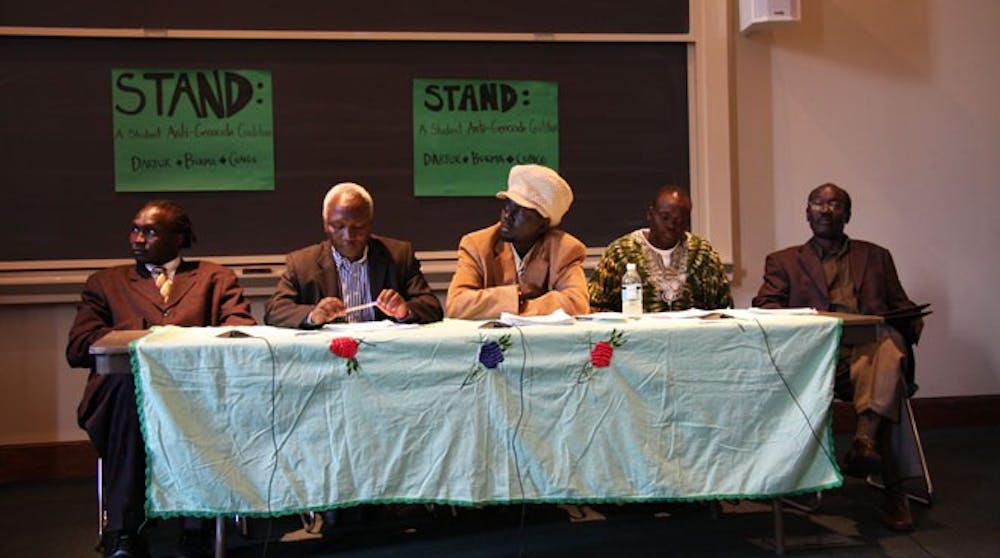The Sudanese ambassador failed to make an appearance at the University of Richmond Wednesday because of a last-minute cancellation. Nevertheless, his unexpected absence was beneficial because he met with the U.S. special envoy in Khartoum, Sudan, instead.
STAND, the anti-genocide coalition that organized this discussion in the Jepson School of Leadership Studies, promoted through extensive lobbying efforts the meeting between the U.S. government and the Sudanese government, for which the ambassador was not present.
"I think it's good that Sudan and the United States are engaging in these discussions," said freshman Maria Sebastian, chapter president of STAND.
Although the ambassador was absent, a panel of five speakers from Sudan spoke and answered questions in front of Richmond students, faculty and guests. The speakers were William Deng, from southern Sudan, Addalla Musa Nour, from Darfur, Dr. Mohammed Ahmed, from Darfur, Anthony Makuach, a lost boy from Sudan and Chol Leeth, from southern Sudan.
The Sudanese panel discussed a myriad of pertinent issues regarding the ethnic tensions plaguing conflict-ridden Sudan, the International Criminal Court's indictment of the Sudanese president and the situation in the Darfur region.
Sudan has been at war since its independence from British rule in 1956, Deng said. Deng, who was a slave in southern Sudan, said he had escaped slavery and had fortunately made his way out of the country.
"I never, ever believed I would end up in America," he said. "I have had many struggles, but I am very lucky."
Arabs, who immigrated to Sudan, bringing different languages and cultures to the region, seek to convert Sudan, a primarily African state, into an Arab-dominated nation, Makuach said.
Sudan suffers from palpable divisions between the northern and southern regions. The north is largely Muslim and Arabic-speaking, and imposes Islamic beliefs on the south. The south is indigenously African in race, culture and religion; its identity is African, with Christian influences and a Western orientation. The civil war has been constant since independence.
In 1983, the president, Ja'far Numayri, dissolved the regional government and imposed Islamic law on the nation. This action threw the Sudan People's Liberation Army (SPLA), a rebel group primarily composed of black Africans, and its political arm, Sudan People's Liberation Movement (SPLM), into a frenzy.
The conflict of 1983 placed a greater emphasis on labels, race and identity. This aggravated tensions between African rebel groups and the Arab-dominated government and allied militias, resulting in separation, discrimination and hatred.
The Sudanese government unofficially funds Arab militias, which have previously had disputes with non-Arabs over resources. The military has unleashed these well-funded, government-armed militias on communities, killing and displacing millions in Darfur. Some categorize the actions of these militias, supported by the Sudanese government, to be ethnic cleansing.
Enjoy what you're reading?
Signup for our newsletter
Recently, the ICC issued a warrant for the arrest of President Omar Hassan Ahmad al-Bashir on charges of against humanity, holding him largely responsible for rape, torture, murder and the displacement of millions.
Ahmed emphasized that the conflicts in Darfur were not about religion; they were directly related to power, race and the allocation of resources.
"You cannot imagine what I've been through," Musa Nour said. "What my people are going through. What is going on today."
Ahmed continued with some specifics regarding the living conditions in the Darfur region. In Darfur, there are more than 4 million displaced, 250,000 refugees, 1 million with no access to water and 1.5 million with no access to food, Ahmed said.
There are roughly 30 universities in Sudan, yet there are more than 40 million people, Ahmed said. There is no infrastructure, there is no development and few feasible opportunities to become educated, Ahmed said.
I hope you will leave here with a better understanding of the conflicts that have ridden Sudan for decades, Deng said.
"We are African," Deng exclaimed. "We are crying for democracy!"
We must act to stop this before we lose more lives, Deng said.
"We need to come together as human beings to fight against this and turn the world in the right direction," he said.
Contact staff writer Fred Shaia at fred.shaia@richmond.edu
Support independent student media
You can make a tax-deductible donation by clicking the button below, which takes you to our secure PayPal account. The page is set up to receive contributions in whatever amount you designate. We look forward to using the money we raise to further our mission of providing honest and accurate information to students, faculty, staff, alumni and others in the general public.
Donate Now



